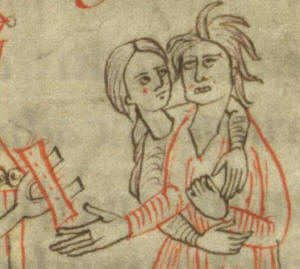
Archbishop of Antivari and Dioklea (Bar, Montenegro)
July August 1202
Similiter sub excommunicatione prohibemus ne aliquis laicus clericum ad peregrina iudicia trahere praesumat, veluti candentis ferri vel aque vel cuiuslibet alterius iudicii. Non enim pertinet ad laicum clericum iudicare.
Similiter sub excommunicatione prohibemus ne aliquis laicus clericum ad peregrina iudicia trahere praesumat, veluti candentis ferri vel aque vel cuiuslibet alterius iudicii. Non enim pertinet ad laicum clericum iudicare.
Die Register Innocenz' III. 2: 2. Pontifikatsjahr,
ed. Othmar Hageneder, Werner Maleczek, and Alfred A. Strnad.
(Publikationen des Historischen Instituts beim Österreichischen
Kulturinstitut in Rom; Wien: Verlag der Österreichischen Akademie der
Wissenschaften, 1979) no. 169.326-330.
Archbishop of Besançon November 13, 1202
E
Die Register Innocenz' III. 5: 5. Pontifikatsjahr, 1202/1203, ed. Andrea Sommerlechner with Christoph Egger and Herwig Weigl (Publikationen des Historischen Instituts beim Österreichischen Kulturinstitut in Rom; Wien: Verlag der Österreichischen Akademie der Wissenschaften, 1994) no. 106(107) pp. 214-215.
Die Register Innocenz' III. 7: 7. Pontifikatsjahr, 1204/1205,
ed. Othmar Hageneder, Andrea Sommerlechner, with the collaboration of Christoph Egger and Rainer Murauer (Publikationen des Historischen Instituts beim Österreichischen Kulturinstitut in Rom. Wien: Verlag der Österreichischen Akademie der Wissenschaften, 1997) no. 113 pp. 176-178
Robert Bartlett, Trial by Fire and Water: The Medieval Judicial Ordeal (Oxford: Clarendon Press, 1986) 100: <Lateran c.8> was not a belated recognition of a long process of withering away. It was a policy decision."
Finbarr McAuley, "Canon Law and the End of the Ordeal," Oxford Journal of Legal Studies 26 (2006) 473-513 at 501: "Quoniam contra falsam (IV Lat. c. 38) appears to have been passed to deal with the problem of corrupt judges . . . a judge who opted to remit a case ad judicium Dei would have complied with the statute <Quoniam contra falsam>.
Charles Donahue, Jr. Review of García's Edition in Speculum: "<c.18> was the death knell of a moribund institution."